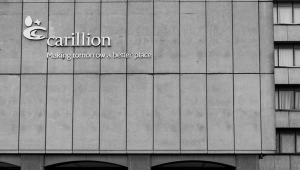Current and former members of Carillion’s board, including interim chief executive Keith Cochrane and chair Philip Green, gave evidence to the joint select committee inquiry into the company’s collapse this morning.
The inquiry is being co-chaired by Frank Field, chair of the work and pensions committee, and Rachel Reeves, who chairs the business, energy and industrial strategy committee.
In a session lasting over two hours, witnesses all expressed their regret for the demise of Carillion.
Green said he was “devastated” by the company’s collapse and the impact it had had on staff, pensioners, customers and suppliers.
But he said thought the board had the right skill level and values to guide the company successfully.
Former chief executive Richard Howson told the committee he believed the company would have survived but for a few “very challenging contracts” in the Middle East.
Cochrane, who served as non-executive director before taking over as interim chief executive, said in late 2015 the board had noted concerns about debt and the pension scheme deficit.
Asked whether, as a non-executive board member, he could have done more, he told the MPs he asked himself that question and wished the company could have acted sooner, but that he believes he made the best decisions with the information available to him at the time.
Following the session, Field and Reeves released a strongly worded joint statement criticising the witnesses for failing to take responsibility.
“This morning a series of delusional characters maintained that everything was hunky dory until it all went suddenly and unforeseeably wrong,” Field and Reeves said.
“We heard variously that this was the fault of the Bank of England, the foreign exchange markets, advisers, Brexit, the snap election, investors, suppliers, the construction industry, the business culture of the Middle East and professional designers of concrete beams.
“Everything we have seen points the fingers in another direction - to the people who built a giant company on sand in a desperate dash for cash.”
The committee also published Carillion’s business recovery plan, which was presented before the company went into liquidation on 15 January.
It noted that this presented a different view of the company’s problems than that put forward by witnesses.
On Carillion’s cash flow, the MPs pointed out that the deficit in net working capital more than doubled from minus £400m in 2009 to minus £834m by the end of 2017. The company was not expected to be see positive working capital until 2021.
Carillion was a major supplier of services to the public sector, and was involved in everything from prison cleaning to school dinners to the construction of the High Speed 2 rail line.
Its collapse has left the public sector scrabbling to fill gaps in services.











